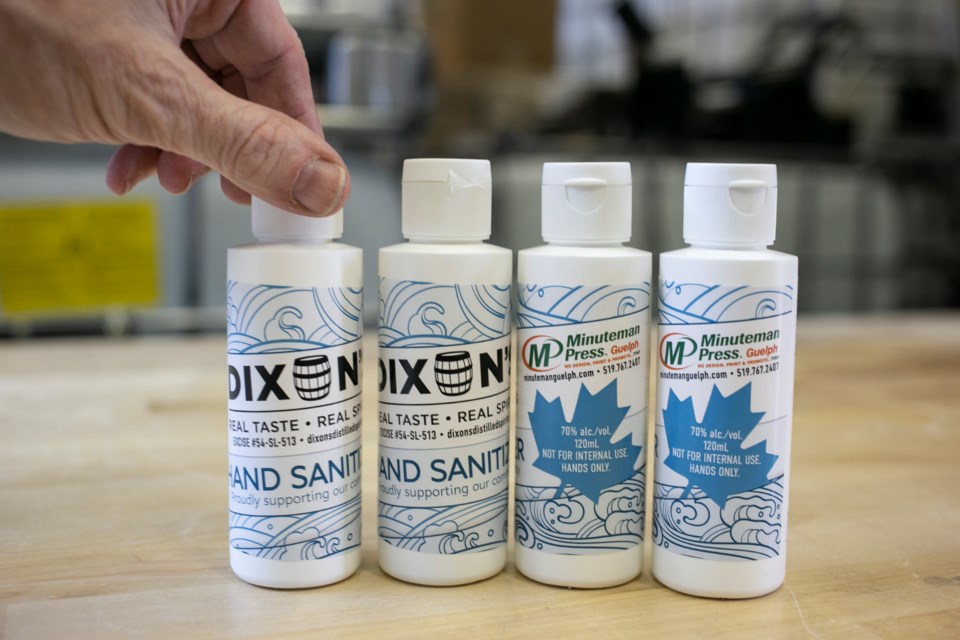The distilleries in Guelph have done their part throughout the pandemic by shifting production lines to making hand sanitizer, says the Guelph Chamber of Commerce, which is asking the federal government to pause the planned increase of excise tax on those businesses.
Last week chamber president and CEO Shakiba Shayani penned a letter to Guelph MP Lloyd Longfield, asking that local distilleries like Dixon’s Distilled Spirits and Spring Mill Distillery not face a planned increase in excise duty taxes on beer, wine, and spirits that goes into effect April 1.
“These distilleries already operate in highly taxed and highly regulated environments, negatively impacting their capacity and competitiveness to export to other countries,” said Shakiba in the letter. “The timing couldn’t be worse to force these businesses to raise the prices of their products.”
Shakiba argues in the letter that local distilleries stepped up
“Local distilleries like Dixon’s Distilled Spirits and Spring Mill Distillery put their day-to-day business operations on hold to make and donate hand sanitizer to our hospitals and first responders,” said Shakiba. “The businesses that are suffering from this escalator tax were among the first in our communities to step up to the plate and shift their operations to help support front-line workers and citizens during the beginning, and throughout all stages of this pandemic.”
She said all levels of government need to stand up to support local, Canadian businesses.
Spring Mill Distillery opened in spring 2019 and the increase in tax is not unexpected, said Cooper Sleeman, manager of sales and marketing.
“This annual increase of two per cent began in 2017, so it’s not a new rule. We have been playing with this rule for a while,” said Sleeman. “It’s a sin tax, so I get it. In this industry we pay a tremendous amount of taxes, both on a federal and a provincial level.”
Sleeman said switching production lines to creating more than 5,000 litres of hand sanitizer was the right thing to do.
“I don’t want to say that we did something good and now we need to be rewarded for it, but I hope the government would consider it and look at everything,” said Sleeman.
Initially, Spring Mill was donating hand sanitizer, but as the volumes that were needed increase it began selling at cost for the 1.89 litre bottles.
“When COVID happened it was really hard to find containers to put hand sanitizer in, so I worked with my suppliers and tried to find anything I could. This particular bottle I was able to find was actually a glass milk jug from a printer I work with,” said Sleeman.
Spring Mill also sells hand sanitizer in 30 ml and 330 ml sizes.
Sleeman said the company is putting the proceeds from the sale of hand sanitizer aside to eventually donate to a Guelph-based charity.
“We are still in the heart of the pandemic and we don’t think it’s over with. Once we can see the end and we don’t have to make hand sanitizer anymore, we are hoping there will be a substantial chunk of money we will be able to give back to the community,” he said.
Vicky Dixon, co-owner of Dixon’s Distilled Spirits, said she appreciates the chamber going to bat for local businesses, but notes that the planned two per cent increase pales in comparison to what the company pays in provincial taxes.
She said any increase will be reflected on the price tag for consumers.
“The problem is when they add two per cent to the excise tax, Ontario taxes that tax. So it goes up on the product shelf,” said Dixon.
Dixon’s has produced an estimated 50,000 litres of hand sanitizer since the pandemic began, said Dixon.
“We have done thousands a month. We are still supplying St. Mike’s Hospital in Toronto and St. Joe’s in Toronto, a lot of school boards and a lot of places that need it,” said Dixon. “It has slowed down a bit, but I know we did at least 5,000 litres (in September).”
The company still offers free hand sanitizer to first responders who come to the Elmira Road distillery. Dixon said that gesture has resulted in a new brand loyalty from some of those same first responders.
“We donated to some Toronto Police and some Milton correctional officers and they are always coming in now,” she said.
Dixon said the company was disappointed that none of the government contracts to produce hand sanitizer went to businesses like hers.
“It’s funny to us that all of the small guys stepped up and did the sanitizer, but the Ontario government and federal government both came to us for Quotes and we never got any of those contracts, they went to people who popped up overnight, which is ridiculous,” she said.
Dixon said the company actually hired additional staff to keep up with the demand for hand sanitizer, as well as for its potable products. She said sales of spirits have increased by 400 per cent.
“In the middle of the pandemic people are drinking more and that is going to cost them more money with the tax increase,” said Dixon.
